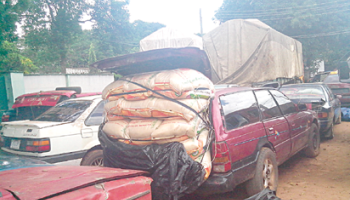
The problems stalling the growth and development of Nigeria can be classified into two categories. The first is the deliberate neglect of available opportunities that can grow our economy. The second problem is our inability to plug leakages that constantly drain our economy. The leakages can be branded under the umbrella of corruption. However, the most debilitating factor is our inability to plug leakages. If we continue to repudiate calls to tap into other resources, to a significant extent, we all know that someday our oil will no longer be as valuable as it is today. Naturally, when we get to that point, we will be forced to explore and exploit other natural endowments of our nation. But the problem with leaving the leakages in the economy to thrive is that no matter how much we make effort, a significant portion of our revenue or due revenue will be lost to unplugged leakages. One of such leakages that currently threaten our economy is the activities of smugglers in the country.
The Minister of Agriculture, Audu Ogbeh, quoting a World Bank report informed reporters after the last weekly federal executive council meeting that Nigeria loses about $5billion to smuggling every year. The minister also said that we have been making progress “here and there”. The Senate Committee on Customs, Excise and Tariff had earlier, quoting the same World Bank report, stated that the country loses about N1.45trillion annually to the activities of smugglers through the Seme border. Further breakdown by the committee shows that $15billion or N4.5tillion worth of goods are smuggled into the country annually, with upsetting effect on the economy. The point is clear: smuggling is a huge business in Nigeria.
The effects of this on the nation’s economy are highly devastating. Activities of smugglers have practically killed the textile industry in the country. In the same manner, smuggling kills the local rice production and consumption in Nigeria.
The strategy to fighting smuggling has been restricted to the security apparatchik in the country. The customs and immigration officers have been fighting the menace through roadblocks and patrol efforts, yet smuggling has been a thriving illegal business in the country. Recently, the Comptroller-General of Customs Service expressed his amazement at how individuals would engage in illegal and risky venture all in the name of money. What the CG seems to be disregarding is that smuggling is not actually carried out by the young boys that are seen driving vehicles with smuggled goods. It is a business run by a well-connected and wealthy cartel that can get whatever they want at any time. Smuggling thousands of tonnes of rice requires sufficient funds that cannot be provided by riff-raff. Another reason that advances smuggling in Nigeria is the absence of deterrence and the huge market for smuggled goods. It is sad that many of the smuggled products are cheaper because perpetrators do not have to pay duties and other charges. Additionally, we have not provided sufficient local supply for the ever-increasing demand. For instance, Nigeria consumes a total 7million metric tonnes of rice annually and our local production is put at 2.7million metric tonnes. That leaves a huge gap to be filled, reckoning that without adequate supply, the locally produced rice will become more expensive as the law of demand and supply necessitates.
Consequently, to deal with this scourge requires a two-pronged approach. There is an economic approach and there is also the security approach. The security approach requires that the relevant security agencies conduct a full chase to identify the financiers of the business in Nigeria and bring them to justice. This is important because it is better to cut off a tree than to cut off the branches. In the same vein, the government needs to provide local incentives that discourage people from patronising smuggled products. The Minister of Agriculture confidently declared that farmers are currently having the best time under this administration because of the policies that have been introduced. That might just be a politically correct statement because we know farmers are not having the best time. The government must intervene in agriculture, not in a piecemeal manner as it is currently doing, but in a more strategic way to ensure that agricultural produce especially staples such as rice become ridiculously affordable for an average Nigerian. When the locally produced goods are cheap, there will be no market for the smuggled ones.
Fighting smuggling is not by making little progress here and there as enunciated by the Minister of Agriculture; it requires systematic drive with the necessary political willpower. The time is now to arrest this menace before it crumbles our economy.
Copyright Ships & Ports Ltd. Permission to use quotations from this article is granted subject to appropriate credit given to www.shipsandports.com.ng as the source.
